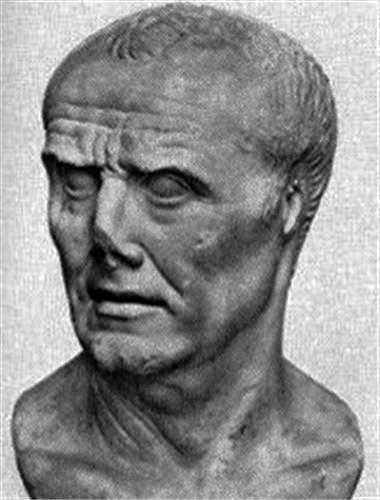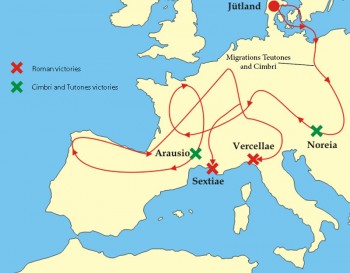Gaius Marius was a “novus homo”, he originated from the Latin family near the city Arpinum. He was uneducated, and he was in an army from an early age. Gaius Marius was brave young man that managed to prove his courage during Numidian war when Scipio Aemilianus noticed him.
In 119 BC, Marius was elected for tribune and that same year he enforced the Law in favour of the plebs. When he married Julia (old patrician genus of Julians) he became part of the aristocracy. He was elected as Praetor and he reigned over Spain. Gaius Marius had great authority among the soldiers, because he was close to them through mind and character..Knights, plebeans and populares voted for him. Marius inflicted series of defeats to Jugurtha a ruler of Numidia (in North Africa). Mauritanian king Bocchus I and Jugurtha father-in-Law took the Roman side. Quaestor Lucius Cornelius Sulla, who was in the Marius army, along with Bocchus I, captured Jugurtha in the Numidian camp in 105 BC. In January 1, 104 BC, Marius celebrated the triumph. Jugurtha went in chains and in royal suit at this procession. Marius ordered Jugurtha’s execution. One part of the Numidian Kingdom went to Bocchus I, and the other part went to Jugurtha’s cousin.
Marius military reform and his war activities



The old system of an army mobilization in Roman Republic has become more and more difficult. For events that happened later not only foreign but also domestic events, Gaius Marius introduced something new. Gaius Marius was the first that started to accept into an army citizens without censors. This was the beginning of changing civil mobilization with voluntary collected army of mercenaries. Soldiers received a certain salary and full equipment while army service has been established onto 16 years. After that they would be dismissed from an army and sometimes they would receive a land. Legion was divided into 10 cohorts (500 or 600 people), which were divided in 2 manipules, and manipules were then divided into 2 centuries. This achieved greater concentration of control (there were no 30 but only 10 tactical units). Weapons and place in the army march was determined by the commanders, and the censors did not have any importance. New flags were introduced; each legion had its own silver eagle. Discipline was significantly strengthened: constantly training was carried out; they worked in camps, built roads, erected fortifications, etc. Combat capability increased. Soldiers used to aim for the war to end as soon as possible in order to return to the land where they had their own farm. However, now soldiers were professionals which strived for new campaigns that promised them loot and wealth; relations between military leaders and soldiers changed a lot. Soldiers were loyal to the successful commanders and they were ready to serve them not only in the foreign wars – but in political consequences.
At the same time, a war with Jugurtha waged in the north against Celtic and Germanic tribes. In 113 BC, near Aquileia, Romans were defeated in the battle at Cimbri. In 105 BC Romans suffered heavy losses at the Battle of Arausio. In this battle around 80.000 Roman troops were killed. The fact that Cimbri decided to attack Spain, saved Roman republic from a complete defeat. In 104 BC, Marius was in charge of the battle. Despite of custom when it comes to electing consuls, Marius was elected in absence as a consul. Results of military reform were noticed very soon and during 104 BC and 103 BC, these reforms passed into preparation of army. In 102 BC, the crowd of barbarian tribes went to Italy, Marius decided to confront them in the decisive battle.
Battle of Aquae Sextiae and Vercellae



In 102 BC, at Aquae Sextiae, Marius finally defeated Teutones, and in 101 BC, he defeated Cimbri in northern Italy in modern Vercelli. The battle ended with complete destruction of Cimbri. Despite already existing Laws, Marius was elected as a consul for five times in a row (107. BC, 104 BC – 101 BC). In that way he had huge influence and impact in the Roman Republic. Democratic groups allowed against the foreign danger formation of the army according to principles that were up until then unfamiliar to Rome. Democratic groups with this act violated the constitution of Rome. This was one of the first steps that led to military dictatorship! Marius celebrated the triumph and in 100 BC he was elected to be consul 6th time. This was the result of Marius alliance with the leaders of populares.
